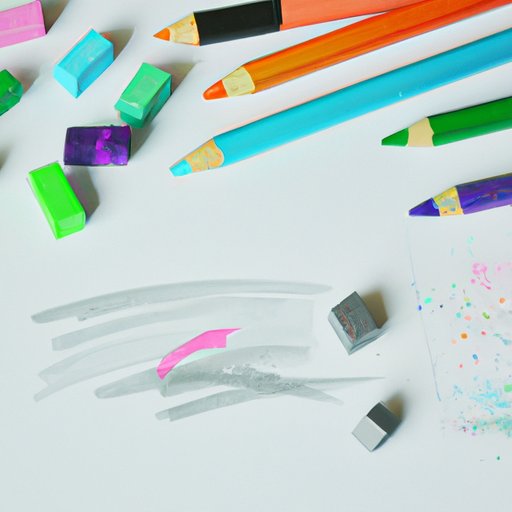
Introduction
Watercolor pencils are a versatile and useful tool for any artist, regardless of skill level. These unique pencils are a versatile cross between colored pencils and traditional watercolor paint. They offer vivid colors and can be used dry or wet, depending on the effect desired. In this article, we will provide an instructional guide, product recommendations, techniques to try, and inspirational ideas to get you started using watercolor pencils.
Step-by-Step Instructional Guide
To get started using watercolor pencils, you’ll need a few necessary materials, such as watercolor paper, watercolor pencils, brushes, and water cups. Once you have gathered all your materials, you can proceed through the following steps:
1. Choose Colors
Start by selecting your watercolor pencils from your collection. You can choose a range of colors or stick with a specific color scheme for your artwork. Watercolor pencils even come in different shades, such as metallic or pastel.
2. Sketch
When using watercolor pencils, start by sketching the outline of your artwork. Keep in mind that the pencil lines will mix with the water, so avoid drawing thick or prominent lines.
3. Apply Water
Next, dip your brush into your water cup and place it on the drawing, letting it absorb and spread. Carefully guide the brush to fill in the areas you want to be colored.
4. Blend
You can blend the wet pencil marks carefully with your brush. Keep in mind that the paper may start to buckle or warp when it’s wet, so use a light touch to avoid tearing the paper.
5. Other Techniques
Once you get the hang of these basic steps, you can start to experiment with different techniques such as:
- Layering colors – using different colors on top of each other
- Wet-on-wet – applying water directly to the paper first before adding color
- Dry brush – using a dry brush to blend dry pencil marks
Materials Recommendation
When shopping for watercolor pencils, you’ll find that there are several options to choose from. The key to selecting the right watercolor pencils for you is to consider your needs and preferences:
- Professional-grade watercolor pencils – offers the best quality, color range, and lightfastness but can be expensive
- Student-grade watercolor pencils – offer a great balance of quality and affordability
- Watercolor pencils with a soft core – great for blending and coloring large areas evenly
- Watercolor pencils with a hard core – great for creating detail and sharp lines
Product Review
After researching and testing various watercolor pencils, we recommend the following brands:
- Derwent Inktense Watercolor Pencils – offer excellent vibrancy and lightfastness
- Faber-Castell Albrecht Dürer Watercolor Pencils – offer a wide range of colors and are easy to handle
- Prismacolor Watercolor Pencils – they blend well and offer a range of colors but are less lightfast
Techniques to Try
With watercolor pencils, you can achieve a range of artistic effects. Here are some techniques you can try:
- Washes – diluting color with water to fill in large areas with a light or dark hue
- Cross-hatching – layering colors by creating lines of different colors
- Blending – smudging or mixing colors to achieve a smooth transition
Inspirational Ideas
Whether you are looking to draw flowers, landscapes, or portraits, watercolor pencils can help you achieve beautiful results. Here are some ideas to get you inspired:
- Drawing Flowers – using watercolor pencils, you can draw beautiful floral arrangements in vibrant colors.
- Creating Landscapes – you can create stunning nature scenes by layering different hues of blue, green, and brown.
- Portrait Drawing – you can use watercolor pencils to create delicate and soft portraits by layering shades of skin tones carefully.
Conclusion
In conclusion, watercolor pencils offer a versatile and unique tool for artists. With the right materials and techniques, you can create stunning works of art that will amaze your audience.





